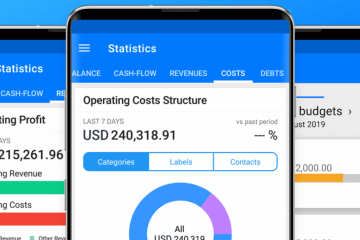Keeping Track: How To Make A Sales Tracker
As a small business, keeping track of your sales is essential.
It helps you keep track of performance, your overall success, and gives you insight into your products, services, and even your staffing decisions. A sales tracker can help turn those sales into data you can use to power your business.
In this article, we will explain:
- The fundamentals of a sales tracker
- How you can use it to your business’ advantage
- A sales tracker you can start using today
Tracking Sales: The Basics
As a team, tracking sales involves much more than the final deal.
The best place to begin is by tracking:
- Calls
- Appointments
- Wins and losses
These are some of the basic metrics that go into tracking sales, because it not only tracks performance (deals won and lost), but activity (calls placed, etc.). When you combine both, you can gain a clearer sense of your success versus the time you put in to gain that success.
In general, sales tracking means to keep records detailing each aspect of the sales process. From the moment you pick up the phone, until the deal is signed, it is designed to keep track of every stage (and how it works versus how it performs).
If it’s done right, your sales tracking system can help you understand:
- Where you can improve the process
- If clients find value in your services (and at what stage)
- How you can turn more prospects into life-long clients
As we dive deeper, we’ll explore more of the terms and metrics associated with great sales trackers, the qualities of the best sales trackers, and how you can get started powering your business with meaningful insight today.
Sales Tracking: The Detailed Breakdown
Let’s say that you’re ready to start tracking sales right now.
For you to do that, you may need a bit more explanation into how to do it, and how to go about it effectively, to build your business in a sustainable way.
If we break it down even further than before, a proper sales tracker might focus on the following metrics to help drive success:
- Calls Made
- Proposals Sent
- Amount of Conversations
- Follow-Ups Scheduled
Based on this, business owners are better able to assess the efficacy of their sales pipeline and how it correlates to meaningful conversions.
This is what we might call the “average length of sales” cycle, with the total amount of open opportunities, closed opportunities, and the percentage therein (what we might call the “win rate”). A low win rate means your business needs to focus on closing.
Then, we need to think in terms of how a business handles new opportunities. If you compare the percentage of follow-ups scheduled, with that of qualified leads, you can understand the volume of new opportunities – and if you are planning your day correctly.
The truth is that all of these metrics are valuable on their own, but you need to bring them together to derive real insight for your business.
Ultimately it can help you:
- Save time
- Close more deals
- Vet unqualified prospects
- Focus on real opportunities
If you build out a sales tracker most effectively, you will even be able to tell the potential of a lead from the moment they speak with your team.
This is based on the fact that, with more data, you can begin to understand “lead behavior” and “lead activity” each time someone reaches out.
With this in mind, you can filter leads out to your sales team, focus on closing deals that work best for you, and even understand which members of your team are performing the strongest.
Features of the Best Sales Trackers
If you are thinking of incorporating a sales tracker into your business, which you should be, you need to think of some of the ideal things you will want it to do.
A great sales tracker will:
- Keep your business organized – with up-to-the-minute details
- Provide access to insights – not only in the sales process but with your finances
- Offer better management – so your employees work on data, not opinion
- Makes access easy – on your phone, tablet, laptop, wherever you need it
When you incorporate a sales tracker into your business, you’re not only learning more about your products, you’re learning about your customers.
That includes the way they interact with you, how they find value, and which strategies are working to convert them (and which ones are not).
Basically, you need to think of it as an exercise in user behavior. When you know how potential leads are going to react to your sales pipeline, you can make dynamic changes to facilitate their interaction with your business.
A sales tracker is step one in that process – collecting the data to make real decisions, and real change, to the way you run your business.
Using a Sales Track to Build Your Business
So, now that you know a bit more about it – and how important it is – how can you begin using a sales tracker to meet the goals of your business?
That’s simple, you need to rely on Board.
Board is a small-business solution that is designed to help understand your finances, where they stand, and where they are going. When paired with essential metrics, like calls placed, it can tell you more about where your money is going in the sales process.
Users of Board have noted a sales conversion increase of 20%, as well as order delivery timelines improved by 30%. These metrics form a clearer picture: Board helps streamline the selling process and gives a clearer vision to your small business.
Interested in getting started with Board? Start by signing up for our WebApp today. Or, find the app on the App Store or Google Play.


